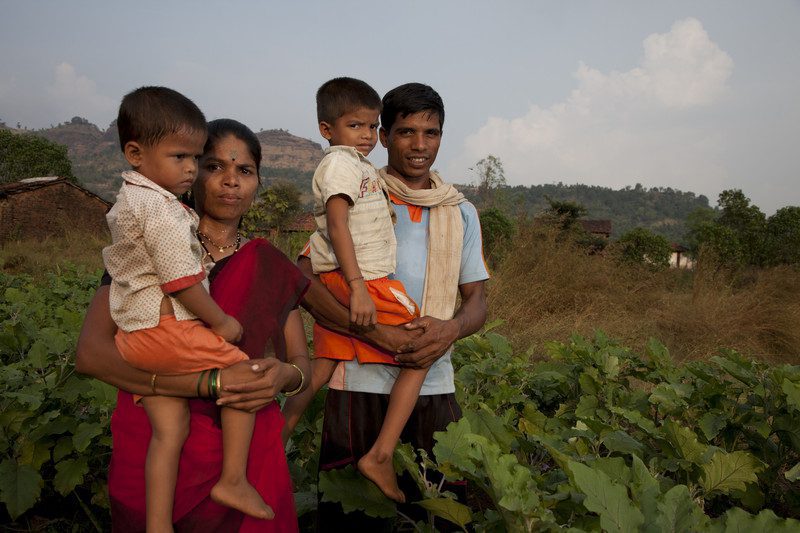
In our latest story from India, we meet Buddhaji and Suman, a young Katkari couple from the tiny hamlet of Bardawadi. Both lived through land grabs as children, when their families were forced from the land they’d worked for generations; neither will ever forget the experience. Since becoming involved with Oxfam partner SAKAV, they’ve been working hard so that their own children never have to go through a similar ordeal.
Interview by Chris Johnson.
Can you tell me what your lives were like growing up?
Buddhaji: During our childhood our parents used to work whole day. They would collect the dry wood from the forest, they would make us carry as a head load, and then they would go to some nearby village or town to sell that dry wood. Whatever proceedings they bring from that sale, that will be eaten … We did not go to school … But now our children are able to go to school; we are able to work in our own farm, in our own village.
Previously we had a very terrible life. I used to go with my parents and work ─ all my brothers and sisters, we used to go … to the charcoal making. My parents, like other tribals [indigenous people] in this area, used to go to charcoal-making in the street quite far from here. Eight months [of every year] we used to stay …
How old were you when you started doing that?
Buddhaji: Five years old. After that it was completely stopped by government, by the intervention of NGOs. There was a retribution in the High Court by NGOs in this area, and the charcoal industry was completely closed down. And then many NGOs started alternative community programs for the tribals, and SAKAV is one of them.
What is life like for you and your family now?
Buddhaji: Previously, I used to work in agriculture, labouring in the nearby villages. Now, after SAKAV’s intervention in this village, they have given us support for agriculture and vegetable growing. So now we have a better life than what we were having a few years back.
What did SAKAV do specifically to help you improve your life?
Buddhaji: SAKAV has specifically given us water pump, vegetable seeds, and importantly the information – how to go about the vegetable crop. That is the main input we have received from SAKAV.
And what do you do with the vegetable crop after harvest? Do you keep some for your family or sell it all?
Buddhaji: After harvesting we consume about 10% at the family level and 90% we sell in the market.
So what is life like for your family?
Buddhaji: Since SAKAV has started giving us support for this vegetable growing, we are having a better life now. At a domestic level we have no problems. We are living better now, and my son is starting in the second standard. Overall we are living a happy, happy life.
Now that you have more food for your family, has that helped your children’s health?
Buddhaji: Previously, the children were very weak – very weak legs and hands – and very big stomachs. They were victims of different types of diseases … they were malnourished. [Now] they are able to go to school.
Do you have your own land or are you working on someone else’s?
Buddhaji: This land I have taken on lease from another tribal family, and I pay about 800–900 rupees (AUD $16.25–18.30) per acre, for a period of 6 months.
What percentage of your income is that?
Buddhaji: I get about 40,000–50,000 rupees (AUD $815–1,015) from the vegetable crop [per year], and I invest only 1700–1800 rupees, which is very less.
Do you both work in the fields to raise the crop?
Suman: Both of us work on the field. After harvesting my husband goes to … different places for selling it, and he brings money home.
A question for Suman: what are some of the challenges you face, raising children and working in the field as well?
Suman: The last four–five years we have been living quite okay life. There are no difficulties as such. I work at home, and then I come to the farm. I am enjoying working here and it is very nice to work outside … So, it’s not hard challenge like we used to have, when the forest guards come and they threaten us…this is not your land, you cannot cultivate here … Now, that harassment is not there.
What are your siblings doing now?
Buddhaji: They are doing agriculture. They are in the same village, in the same area.
Are they also being helped by SAKAV?
Buddhaji: Yes, they are also getting support from vegetable growing. There is a huge difference between … our childhoods and our children’s life. This area has changed a lot.
In what sense?
Buddhaji: In the sense that there’s nice plantation, there is no trade from the forest department …We are working on our own field. Previously we used to migrate eight months together [every year].
What do you hope for your children’s future, as they grow older? What are some of your dreams for them?
Suman: I want my children to study a lot. I want them to become either doctor or some government official. I do not want them to remain on the farm. They should learn more, they should educate themselves. One of them should become doctor, one of them should become government official.
You can help poor families like Suman and Buddhaji gain financial security and grow a better future by donating to our Harvest Appeal.
Next week: Ganesh and Anusaya on going from exploitation to independence…